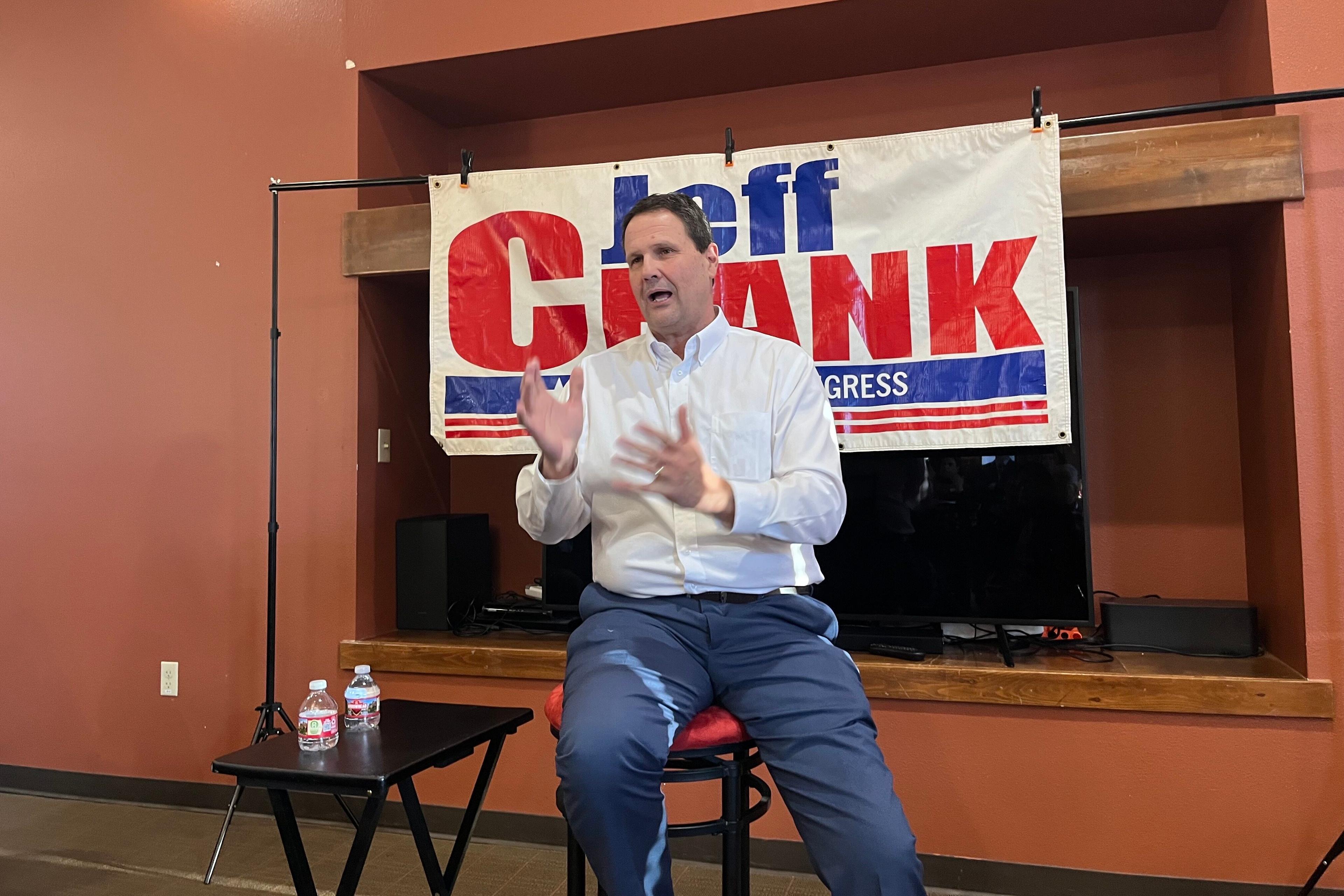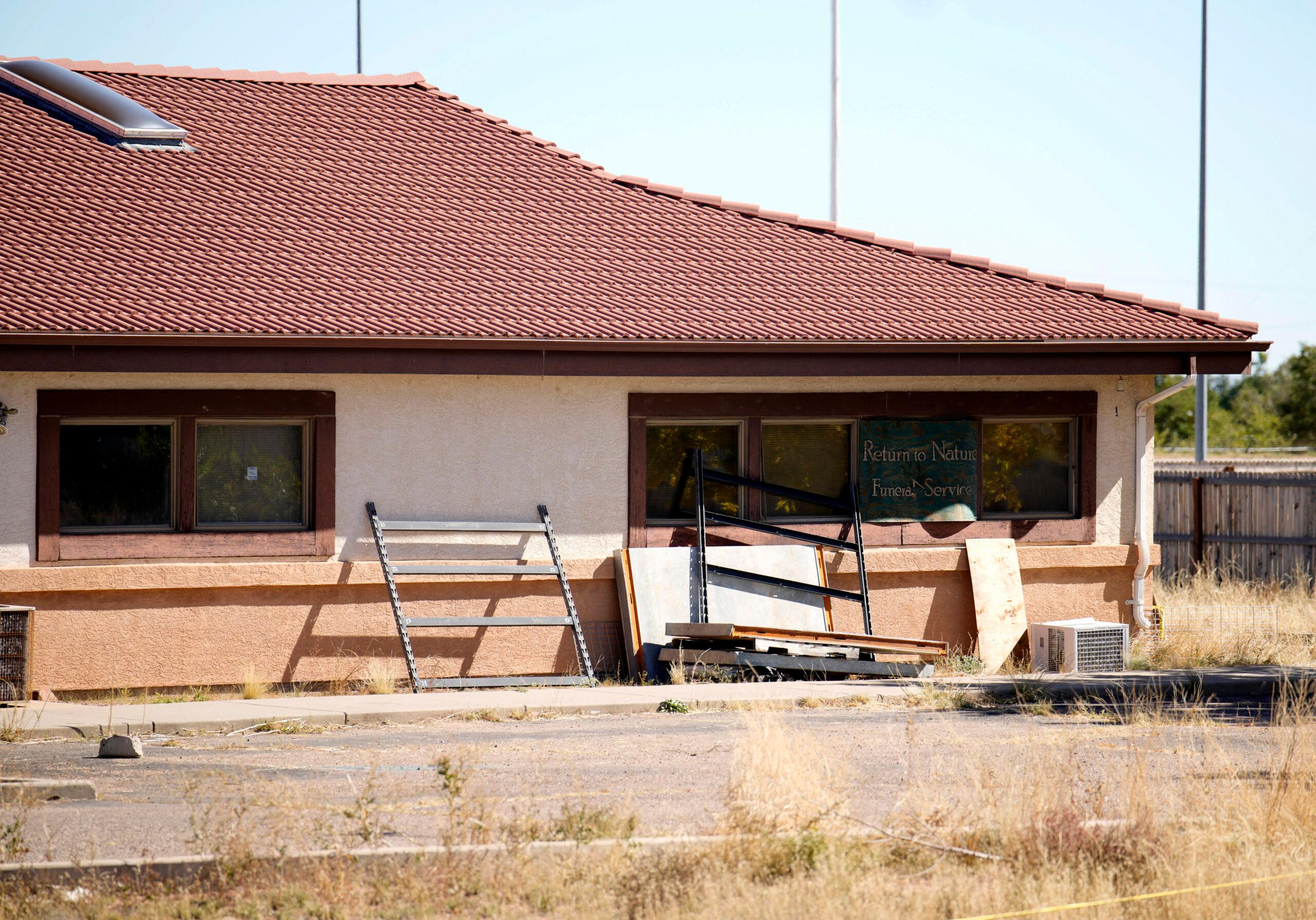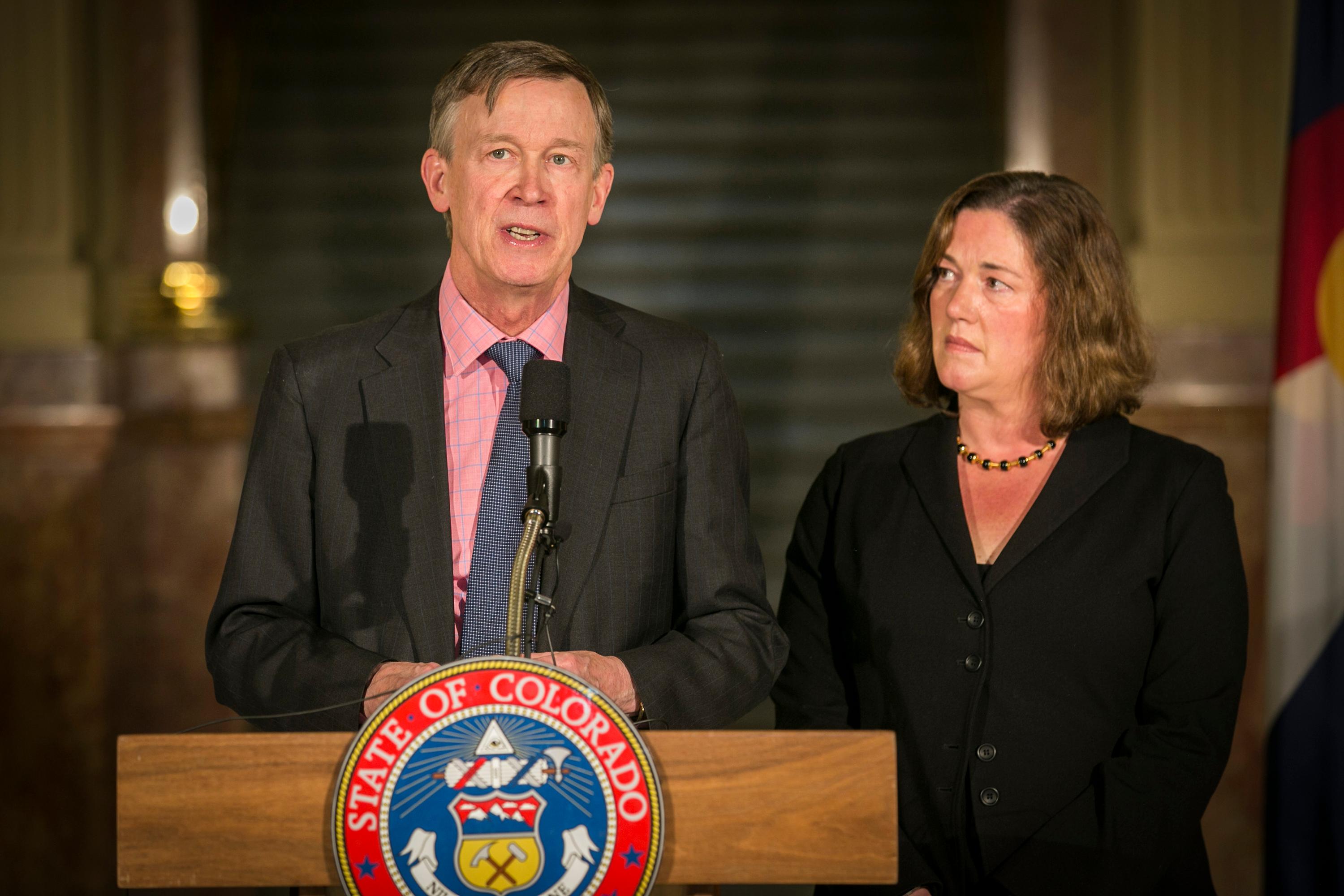
An open seat for Congress is something voters in Colorado’s 5th District haven't seen in years. Longtime Republican Representative Doug Lamborn, of Colorado Springs, announced his retirement at the beginning of the year.
Republican Jeff Crank has been eyeing this seat for awhile. He lost to Lamborn in the 2006 and 2008 primaries. Most recently, the former political consultant and talk radio host defeated the embattled head of the state GOP, Dave Williams.
“I think I'm a good fit for this district. I think this district does believe in conservative values. They still believe in limited government,” Crank told CPR’s Southern Colorado reporter Dan Boyce. “Most citizens here understand inflation is caused by the excess of government. Government spending too much money, and it's hurting them, it's hurting their lives. If I get that message out, I will win this election, and I believe that we will be representing the people and the citizens of this district well in Washington, DC.”
Among his priorities: defense spending, the national debt, and immigration.
This transcript has been lightly edited for clarity.
Dan Boyce: Name a specific problem here in the district and why voters should send you to Washington to fix it.
Jeff Crank: One of the great problems I think, and potential opportunities for our district, is the defense economy and the defense sector here in Colorado Springs in El Paso County. That's always been the linchpin for our community economically, our five military installations, but we have a growing cybersecurity and space-based industry here, which really has grown over the last 15 to 20 years. A lot of companies are coming here, high-tech companies, and we need to foster that. They're here in part because we have these five military installations, and particularly US Space Command and a lot of the cyber work as well that's done here in Colorado.
I think I'm uniquely qualified to help on that issue because I spent time working on that, both from a community standpoint, I spent several years at the Colorado Springs Chamber working on those military issues, but I also worked for eight years back in Washington, DC in the Congress and worked with the House Armed Services Committee to pass laws that helped strengthen our military bases here in our community. And I also have the relationships here that will help us build on that. I plan to put together a military advisory committee that will help us, and it's not just going to be retired military folks, but it'll be people from that industry, from those industries coming here to help us strengthen that sector, grow the economy, and grow jobs in that part of the industry.
Boyce: I really want to spend a good amount of time talking about defense and particularly its relationship to spending and unfold that a little bit, because another part of your platform is concern over government spending. And so right now let's just talk about the national debt. As of late September 2024, it's $35.3 trillion and we're expected to spend more on just the interest payments on that debt this year than on defense, which is an astonishing statistic to read. So you say you want to rein in current government spending. That's a tall order on its own. Now, there are some economists who disagree on the importance of the national debt, but how important do you see it as being a priority to seriously tackle the existing debt?
Crank: I'm very happy that you picked up on that. There aren't a lot of people who know. That should be the biggest warning sign to us that we now spend more money on servicing our debt than we do on the number one priority that the Constitution lays out for the federal government, which is the defense of our country. And most people don't understand that. That should be the clarion call to us about how important this is. We've got to get control of it.
To economists who don't think that debt is important, I would say look at Greece many years ago. We can't continue, a country can't continue, a family can't continue to live beyond its means. We just can't do it. Debt does matter. Ultimately, that debt will be called and we're going to keep crowding out defense, we're going to keep crowding out the priorities that we should be spending it on. I'm for infrastructure and highway funding and things like that, but that's going to continue to get squeezed out as well, unless we make some tough choices.
Boyce: It seems if you are going to tackle the debt, then what you also have to do is you have to tackle some of the sacred cows. And that's been politically burdensome for folks to try to do that. And you would have to look at the big things, whether it's entitlement reform or even look at something like defense spending. How do you tackle those things in a way that doesn't just completely alienate you?
Crank: Let me talk about defense first. I think while I believe we ought to be spending more on defense than we are currently today, I also believe that we ought to be rooting out a lot of the waste that's in the Pentagon and the Department of Defense. There's plenty of waste that we can go after and we need to do that, and we need to reallocate that. I mean, we've got soldiers at Fort Carson that would qualify for food stamps on what they make right now. I mean, we can't do that to a military and expect folks to reenlist and keep defending our country, so we have real problems there.
We have a threat from China. Our Navy right now. I frankly worry that if our Navy got in a naval battle with China, that we would have the resources to win, the ships to win. So that is the number one priority of the federal government, so we've got to do that. But to your point, we've got to examine all of the things that the federal government is involved in right now and say, "Can we afford these things? Are they all have-to-haves or are some of them nice-to-haves? And are there things that we can cut back?" Washington never does that, they never examine that spending.
Now, that's all talking about the federal discretionary spending, that pot that is all not on autopilot. But then there's a whole host of things like social security and Medicare and other things that are on autopilot. They just keep growing and we do have to address that. I'm all in favor of addressing that, not in a way that hurts existing recipients, but in a way that looks down the road and says, "How can we make these programs more steady and stable for future beneficiaries?" And young people I think are kind of waking up to this. They get that right now we're paying social security benefits and those benefits are going to help current recipients. When I pay my social security today, it's not put in an account somewhere for me to get out later. It's, I'm paying it, and my grandparents, if they were still alive, are taking it out in benefits, which works as long as there's people coming into the stream behind you.
And that's where we have a problem with things like social security is further down the road, so we ought to come up with a way that looks at future retirees, maybe gives them a different way to invest. I look at it, my son is 27 years old and he told me, he says, "Dad, I'd love to take the money that goes into social security and instead of putting it into social security, set it aside and put it into a 401(k) that goes with me, is portable wherever I go, and I can't take, I have to do it, a law that says I have to put into that, but I can take it out and I can go from job to job and it's portable. It would be a way to do it."
Now, he would rather do that. So if he does, why not give future beneficiaries? If you can set up a system that keeps social security solvent through that, but then allows people to choose to do those things. And that's what I'm all about is choosing. If people still want to stay on a social security system, it might not pay them the benefits that a different system would pay them, but they could still choose that. And those are the kinds of things I think we ought to examine and look at. I'm not laying that out as, "Gee, I'm going to vote for this," but those are the kinds of discussions we've got to have in Washington.
Boyce: There's a ton of spending through the pandemic, both in the Trump administration and in the Biden administration on programs intended to help keep the country afloat through that difficult time. And here locally, we have received tremendous heaps of rewards from that. And the one I'll specifically point to is something like the CHIPS and Science Act, where Colorado Springs, this district, has received more than $150 million in direct investment in semiconductor manufacturing here locally, bringing jobs, etc., etc.
And I went to a press conference where current incumbent, Doug Lamborn, was there. He was touting this investment here locally. At the same time he voted against those acts. And it's not a value judgment there, but I asked him about that specific thing afterwards and he goes, "Well, yeah, I disagree in that spending, but I'm sure glad it's here." And I feel like that's another one of those disconnects. So I suppose, Congressman Lamborn's vote against the CHIPS and Science Act, what do you make of that call specifically?
Crank: I would've voted against the CHIPS Act too because I think it was a bailout, just like we had a bank bailout before where we had to do it in 2008, but it was based on bad government policies before that, that caused banks to have to give risky loans and other things out. And I wasn't for that. I wouldn't have voted for the bank bailout and I wouldn't vote for the CHIPS Act.
Now, I would argue that there's a lot of people who would say, "Hey, all these great things have happened in our community because of that investment, the money that came in from COVID relief and all the spending that we did." Agree. What's the flip side of that coin? The flip side of that coin is that all that spending caused inflation. That's what caused the inflation is we just spent like drunken sailors. The Trump administration did it because we were worried about COVID. Thinking back, I'm trying not to be a revisionist in history.
I realize why people wanted to do it, but then it got so out of hand and I think it got out of hand under the Trump administration, it got way out of hand on the Biden administration. We're still spending, in a post-COVID world, we're still spending that same kind of money. We should immediately go back to pre-COVID spending levels at the federal level. You talk about cutting the deficit down and what that would do to help us get control of our fiscal house.
Just going back and saying, "Look, we're going to go back to 2019 spending levels." Pre COVID, that would save trillions of dollars, trillions of dollars, literally. And I think over a period of about five years, if you did that and you cut one percent or two percent out of even just discretionary spending, it would get us very close to a balanced budget in a few years. But we just don't seem to have the appetite in Washington, DC to do that.
Boyce: You responded to some questions for CPR for our primary voter guide, and during one of those questions you gave Congress currently a grade of a C minus, and one of the things that you said was that…
Crank: They're lucky I'm an easy grader, by the way.
Boyce: So you gave them a C minus, and part of that was about what I would call maybe the consistent budget standoffs that happen. And those standoffs often do come from the Republican Party. You're saying that this is just failing to follow the order of the chamber. You're coming in, then you're part of a big body of Republicans. How do you try to showcase that leadership on trying to make these budget standoffs, not something that we have to deal with every single time the budget comes up?
Crank: Well, it's not just Republicans. I mean, if you look at where we are currently right now, the House of Representatives passed a bunch of appropriations bills this year. They actually did their job. The Senate hasn't passed a single appropriations bill. That's Charles Schumer. I mean, Democrats typically want this sort of crisis at the end because you can throw stuff in, they can throw in a bunch of spending at the end of the year too, and we all have to do it because there's a sort of a gun held to the head of government where we say, "Look, it's all going to close if we don't pass this spending bill." And I will say this, when there are government closures, it never benefits Republicans. I don't know why people would want to bring it to the brink. They always get blamed for it. I have my reasons why I think that is, but it isn't always their fault. Sometimes it is.
But here's the reality. They're all breaking the law by doing this. There's a Budget Control Act and Congress, under that act, Congress is supposed to pass 13 regular appropriations bills and they're supposed to do it every year. And they haven't done it under Nancy Pelosi, they haven't done it under Mike Johnson, under Kevin McCarthy. For decades, we haven't done that because it's easier for Congress to be undisciplined, wait until the last minute, have three or four leaders sit in a room, and hammer out some agreement. That is not the way the process is supposed to work. So whether you're a Democrat or whether you're the Republican, they need to get back to regular order where members can go into committee, where they're experts, and talk about these issues.
The House Armed Services Committee, the members of that committee are the experts on defense spending. They know whether it's better to spend money on Project X or Project Y. Right now that's not being done because we're just lumping it all in, people get to throw whatever they want in. That is not the way to run this. Our founders knew that and that's why they set up the institutions that they did. We need to follow that and get back to that. And I'll hold Republican leadership accountable to that and I'll hold Democrat leadership accountable to that.
Boyce: I want to touch on immigration. So a secure border is part of your platform. We've had tens of thousands of immigrants landing in Colorado in the last year. And one question is about, how do we secure this border? And another very important question is what do we do with these new folks who have arrived here? The Trump campaign is advocating for the biggest deportation in American history. What do you think should be done with these new people who, I mean they've achieved their dream of making it into the United States regardless of the circumstances that came before. What should be done with those folks who are here now?
Crank: Well, you have to look at this in a couple of ways. The American people, I think, are demanding a secure border, and we always use every excuse why we can't do it. We have to come up with an agreement, we have to do this. No, we need to secure the border. Period. We need to do that. The American people want that done. So I would say this, it's a bit premature for us to talk about, well, let's say this. Let's say we're at a sink and our bathroom is flooding. Isn't the first thing we should do before we talk about how we're going to fix the sink and what we're going to do to the floor and all of that, shouldn't we turn the water off first? And that's what I look at with our border. Let's stop the problem first.
We could secure our border. I've been down there and I visited with the men and women who fight every day on the border, the border patrol. They are having a hard time retaining border patrol agents because they're so frustrated that they're not allowed to do their job. Every one of them will tell you, "We could secure this border if we were allowed to."
Boyce: Well, the number of immigrants who are crossing the Southern border has gone down a good amount from its peak.
Crank: It does every year seasonally this time of year because it's 112 degrees. And so every year, if you look every year around June, July, and August, the numbers start to dip because it's just so dangerous down there. So yes, they've dipped, but we've allowed at least 12 million people to come into the United States over the last four to five years for sure.
Boyce: I do want to press you on, what do we do with the folks who are here now?
Crank: Yeah. So again, let's turn the water faucet off first, let's stop the problem. And then once we do that, we have to talk about what we do with the people who are here. You can't continue to reward illegal behavior. It is illegal to cross the border into the United States when you're not crossing at a border station. It is literally illegal for someone to walk across, not at a controlled border station. That's the definition of what makes it illegal. They're supposed to come to a point of entry and come through there.
And we do that for a reason because we, like Mexico and every other country, want to control our border. So what do we do with them? There are going to have to be deportations. There has to be a price to pay for breaking the law. And if we don't, what do we do? Just let 12 million people say, "Well, we wave the magic wand. We'll start here again." Then what? Another 5 million come and then we wave the magic wand? We have to be a nation of a rule of law. And if we don't have a rule of law, we're not really a country.
I mean, if you don't like what's happening at the border or you don't like the current border laws, and let's say, you say, "Hey, if you want to come to the United States, you think that you should be free to come here no matter what." Let's say you were for open borders, that's great, but that's not our law. You need to do the right thing and change the law. We can't just ignore the law because pretty soon you don't have a law if you continue to ignore it. So there is going to have to be deportations of people who are here illegally.
Boyce: Finally, I want to touch on conservatism in Colorado. So the Republican Party here in the state is, I think any reasonable person would say, in disarray and largely fractured right now over the leadership of your primary opponent, Dave Williams. If you go on to win this seat, you'll be top Republican brass in Colorado. How do you unify the party? How do you help knit things back together and get the Republican Party to a place where it's not just losing all the time?
Crank: Yeah. Well, we're already doing it. Once we won the primary, we immediately started working with all of the candidates, some of which I supported in primary, some of which I didn't, were out walking. Now, this is in El Paso County, so it starts here, and El Paso County is a big part of the Republican Party. As you mentioned, my opponent who's the current chairman of the Republican Party, he came out of El Paso County. So this is where we've got to start fixing, what is the mess?
Look, a Republican Party or a Democrat Party is different than a PAC, for instance. So if you're a Democrat or a Republican, basically you sign up to support whoever's on that team. And that's not been happening in the party here. Voters should decide, not party bosses, not people inside the party, who get to decide who the nominees are. It should be the voters. And that happened in the primary. In my primary, they chose me. In other primaries, they chose candidates, and we just move on.
So I think the way you do it is stop talking about unity and you start doing unity. And the way we've done that, we meet every week, we walk for all of the candidates in that area that we're meeting in for folks. We have more people out walking, guaranteed, than the Democrats do in this county. It's not being led by our party, but it's being led by the leaders, the nominees, who got selected by the voters. So we're going to have to keep pushing that. But look, the future of any party, and by the way, Democrats in Colorado, they have their problems too. They have some crazies that they need to get control of, and they tried to do that in some primaries and they were successful in some primaries in Denver.
The extremes on both sides of the party are drawing reasonable people away, and that's one of the reasons why I think a lot of unaffiliated voters in the primary came and voted for me in that primary because they saw me as a person who was trying to not only unify the party, but be a common sense conservative who's going to go out and fight for the principles that I believe in, but try and grow the party. You're not going to win in Colorado by just winning Republicans. You're not going to win in Colorado by just catering to the liberal Democrats. You're going to win in Colorado by having common sense solutions that unaffiliateds can get on board with.
Boyce: This district as long as it has existed has been a Republican stronghold, but the demographics are changing here locally. How do you be that person who tries to authentically represent the whole of your district?
Crank: Yeah, you be yourself. I mean, lucky for me, I think I'm a very good fit for this district. I think this district does believe in conservative values. They still believe in limited government, and it doesn't matter honestly on Second Amendment rights. I think the vast majority of people here, they don't have to be members of the Republican Party. They believe in the right that citizens have under the Second Amendment. I believe that most people here saw the excesses of COVID and the heavy-handedness of government coming in. I lost my job at a radio station here because they said, "Oh, you got to take the vaccine. Even though you do your show from home, you have to take the vaccine now."
What was that about? That was about control. I think most people see it, I think people who go to Colorado College or UCCS, they see that. They see government can be excessive in pushing these things. They understand. Most citizens here understand inflation is caused by the excess of government. Government spending too much money, and it's hurting them, it's hurting their lives. If I get that message out, I will win this election, and I believe that we will be representing the people and the citizens of this district well in Washington, DC.









